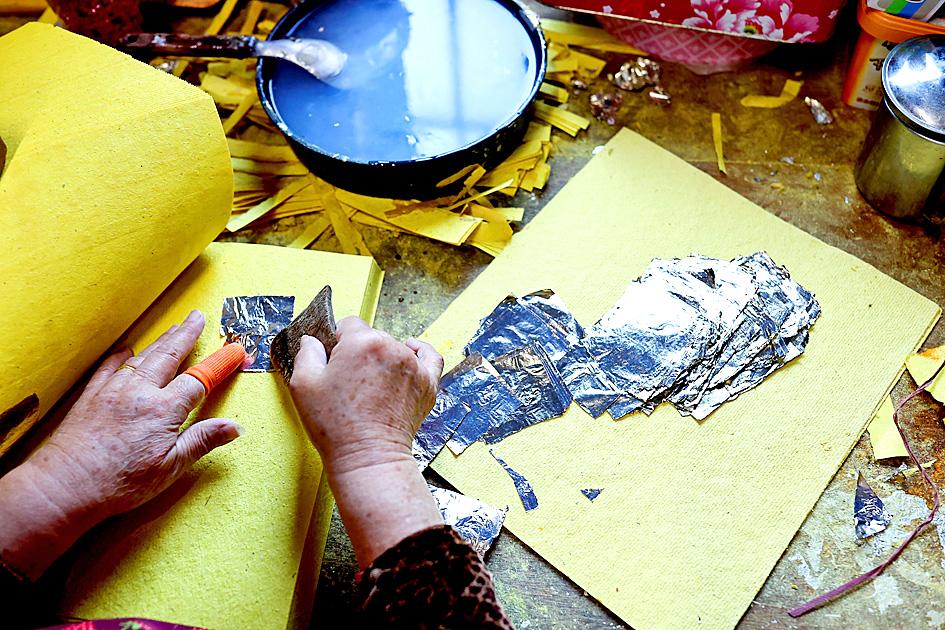Painstakingly, women of retirement age adorn sheet after sheet of yellow joss paper with gold and silver leaf and red paint to satisfy last orders for sacrificial cash offerings ahead of the Lunar New Year holiday.
Chen Kun-huei (陳坤輝), 82, is determined to keep alive an ancient tradition of making the “ghost money” by hand even as others have shifted to automated production at factories.
“I will continue making ghost money until I can’t move anymore,” said Chen, the third-generation owner of his family’s business in Miaoli County.

Photo: Ann Wang, Reuters
Altogether, the Chens have been making ghost money for about 100 years.
Also called joss paper in English, ghost money is one of the most common offerings in Taiwan, burned at temples and outside homes to honor deities and ancestors while praying for many children, prosperity and longevity.
It is used during all holidays in Taiwan — Chen says there is only one month of downtime in a year — with the most offerings made during Lunar New Year and Ghost Month, or the seventh month of the lunar calendar.
“There are just too many temples in Taiwan,” said Chen’s daughter, Chen Miao-fang (陳妙芳), explaining why demand for ghost money remains high.
After growing up in and around the workshop, Chen Miao-fang is now in charge of taking orders.
The Chens’ way of making ghost money is fading quickly due to a lack of people willing to do the repetitive work and competition from big commercial printers producing cheaper, colorful alternatives.
Only a few other workshops also still make the sacrificial paper by hand.
“In the future this might all be replaced by machines,” Chen Miao-fang said, looking around wistfully at the family’s small-scale operation.
For now, the Chens have a loyal base of customers who value the high quality of their product.
The week-long Lunar New Year holiday begins on Saturday.

PERSISTENT RUMORS: Nvidia’s CEO said the firm is not in talks to sell AI chips to China, but he would welcome a change in US policy barring the activity Nvidia Corp CEO Jensen Huang (黃仁勳) said his company is not in discussions to sell its Blackwell artificial intelligence (AI) chips to Chinese firms, waving off speculation it is trying to engineer a return to the world’s largest semiconductor market. Huang, who arrived in Taiwan yesterday ahead of meetings with longtime partner Taiwan Semiconductor Manufacturing Co (TSMC, 台積電), took the opportunity to clarify recent comments about the US-China AI race. The Nvidia head caused a stir in an interview this week with the Financial Times, in which he was quoted as saying “China will win” the AI race. Huang yesterday said

Nissan Motor Co has agreed to sell its global headquarters in Yokohama for ¥97 billion (US$630 million) to a group sponsored by Taiwanese autoparts maker Minth Group (敏實集團), as the struggling automaker seeks to shore up its financial position. The acquisition is led by a special purchase company managed by KJR Management Ltd, a Japanese real-estate unit of private equity giant KKR & Co, people familiar with the matter said. KJR said it would act as asset manager together with Mizuho Real Estate Management Co. Nissan is undergoing a broad cost-cutting campaign by eliminating jobs and shuttering plants as it grapples

The Chinese government has issued guidance requiring new data center projects that have received any state funds to only use domestically made artificial intelligence (AI) chips, two sources familiar with the matter told Reuters. In recent weeks, Chinese regulatory authorities have ordered such data centers that are less than 30 percent complete to remove all installed foreign chips, or cancel plans to purchase them, while projects in a more advanced stage would be decided on a case-by-case basis, the sources said. The move could represent one of China’s most aggressive steps yet to eliminate foreign technology from its critical infrastructure amid a

MORE WEIGHT: The national weighting was raised in one index while holding steady in two others, while several companies rose or fell in prominence MSCI Inc, a global index provider, has raised Taiwan’s weighting in one of its major indices and left the country’s weighting unchanged in two other indices after a regular index review. In a statement released on Thursday, MSCI said it has upgraded Taiwan’s weighting in the MSCI All-Country World Index by 0.02 percentage points to 2.25 percent, while maintaining the weighting in the MSCI Emerging Markets Index, the most closely watched by foreign institutional investors, at 20.46 percent. Additionally, the index provider has left Taiwan’s weighting in the MSCI All-Country Asia ex-Japan Index unchanged at 23.15 percent. The latest index adjustments are to